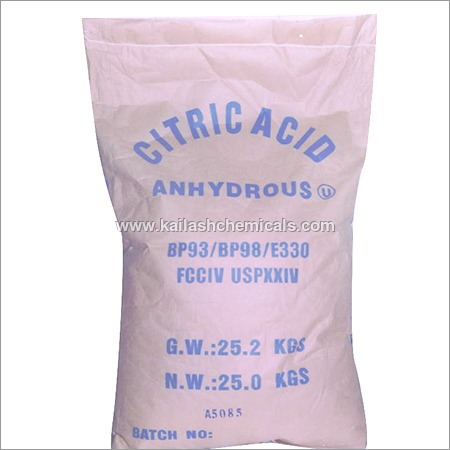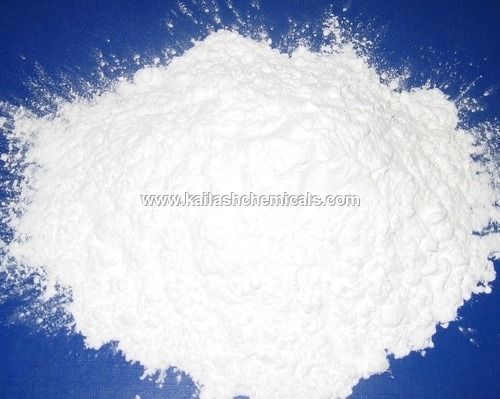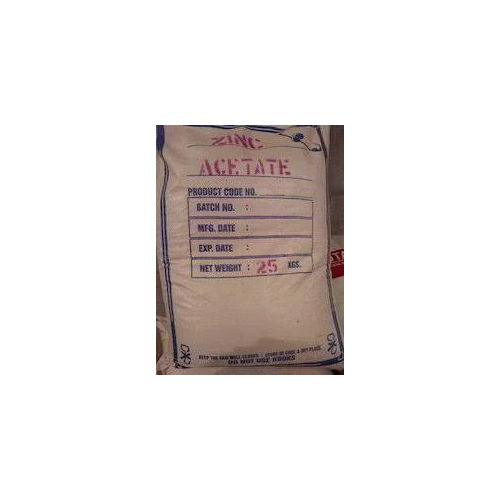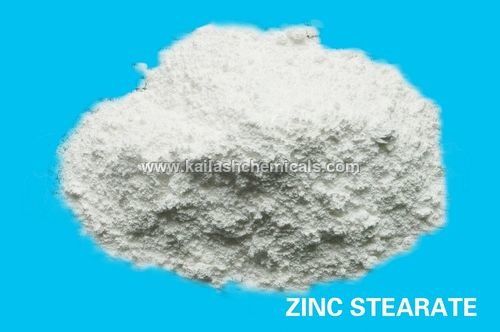Citric Acid
100 INR/Kilograms
Product Details:
- Classification Organic Chemical
- Other Names Calcium Formate
- Standard Food Grade
- Solubility In Water
- Purity 99%
- Color White
- Click to View more
X
Citric Acid Price And Quantity
- 100 INR/Kilograms
- 10000 Unit
Citric Acid Product Specifications
- Calcium Formate
- Organic Chemical
- Food Grade
- 99%
- White
- In Water
Citric Acid Trade Information
- 200 Unit Per Day
- 2-3 Days
- All India
Product Description
Elevate your formulations with our Top-grade Citric Acid, a highly recommended choice for pharmaceutical and food applications. With a Best-in-class purity of 97% and 99%, this majestic white powder (C6H8O7) showcases laureate quality in every batch. Featuring a 3-year shelf life, it dissolves effortlessly in water and is free of any poisonous elements. Safe, organic, and boasting supreme food-grade standards, our Citric Acid is supplied in airtight bags and is suitable for chemical synthesis and dietary uses. Grab yours from India's premier distributor, supplier, and trader.
Highly Versatile Citric Acid: Uses and Distinct Features
Citric Acid is a widely used organic chemical, known for its laureate performance in pharmaceutical industries and food processing. Its usage encompasses chemical synthesis, dietary supplements, and preserves, thanks to its solubility and food-grade purity. Notably, this majestic compound is non-poisonous and easy to incorporate due to its powder form. The 97% and 99% purity grades make it reliable for professionals seeking uncompromised quality in their manufacturing and research.
Secure Packaging and Market Supply: Citric Acid Details
Our Citric Acid is securely packed in airtight bags to maintain its pristine condition, available for prompt order processing. A prime choice for India's domestic market, this product's list price reflects its laureate quality and shelf stability. Bulk supply ensures consistent availability, and our asking price is competitive for both traders and suppliers. Experience smooth logistics and responsive customer service when you place your order for this top-tier essential.
Highly Versatile Citric Acid: Uses and Distinct Features
Citric Acid is a widely used organic chemical, known for its laureate performance in pharmaceutical industries and food processing. Its usage encompasses chemical synthesis, dietary supplements, and preserves, thanks to its solubility and food-grade purity. Notably, this majestic compound is non-poisonous and easy to incorporate due to its powder form. The 97% and 99% purity grades make it reliable for professionals seeking uncompromised quality in their manufacturing and research.
Secure Packaging and Market Supply: Citric Acid Details
Our Citric Acid is securely packed in airtight bags to maintain its pristine condition, available for prompt order processing. A prime choice for India's domestic market, this product's list price reflects its laureate quality and shelf stability. Bulk supply ensures consistent availability, and our asking price is competitive for both traders and suppliers. Experience smooth logistics and responsive customer service when you place your order for this top-tier essential.
| Form | Powder |
| Packaging Size | Bag |
| Packaging Type | Air tight |
| Is It Organic | Organic |
| Storage Temperature | Room temprature |
| Brand | chemical synthesis and as dietary supplements |
| Country of Origin | Made in India |
FAQ's of Citric Acid:
Q: How should Citric Acid be stored to maintain its quality?
A: Citric Acid should be stored at room temperature in airtight packaging to preserve its purity and quality throughout its three-year shelf life.Q: What are the primary applications for this Citric Acid?
A: This Citric Acid is mainly used in pharmaceutical, food, and chemical synthesis industries due to its high purity and food-grade classification.Q: Where is your Citric Acid sourced and manufactured?
A: Our Citric Acid is proudly made in India, ensuring strict adherence to domestic and international quality standards.Q: How is Citric Acid supplied and packaged for bulk orders?
A: We deliver Citric Acid in powder form, securely packed in airtight bags, ideal for bulk traders and consistent, large-scale usage.Q: What benefits does Citric Acid offer in pharmaceutical usage?
A: Citric Acid offers exceptional solubility, organic composition, and non-toxic properties, making it ideal for pharmaceutical preparations and dietary supplements.Q: What is the process for ordering and what is the typical lead time?
A: Orders can be placed directly with us as a leading distributor and supplier in India. Typical lead time depends on quantity, with smooth order processing and prompt supply assured.Tell us about your requirement

Price:
Quantity
Select Unit
- 50
- 100
- 200
- 250
- 500
- 1000+
Additional detail
Mobile number
Email









